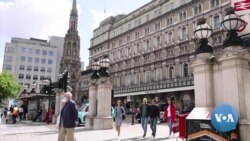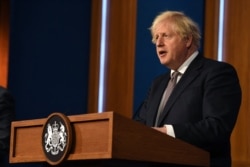Britain is about to try something that no other nation has yet dared: lifting coronavirus restrictions amid a new wave of infections.
The government says that with more than half of Britons now fully vaccinated, the time is right to reopen in the coming weeks. However, some scientists have warned that a sudden reopening of the economy and society is a big gamble as infection numbers rise.
In a televised press conference Monday, British Prime Minister Boris Johnson outlined the end to lockdown measures beginning July 19.
“Our vaccines have helped to break the link between disease and death,” Johnson said. “And as the days have gone by, it has grown ever clearer that these vaccines are indeed successful, with a majority of those admitted to hospital unvaccinated.”
“We must be honest with ourselves that if we can't reopen our society in the next few weeks, when we will be helped by the arrival of summer and by the school holidays, then we must ask ourselves when will we be able to return to normal?” Johnson said.
Final confirmation of the lifting of restrictions is expected July 12 after the release of further data on vaccinations and infections.
Under the plans, businesses such as nightclubs will re-open for the first time in sixteen months. The one-meter social distancing rule will be lifted; pubs and bars will no longer be restricted to table service only; there will be no limit on customer numbers.
Employees will no longer be encouraged to work from home. Facemasks will no longer be compulsory, only recommended in certain environments. “The situation you're most likely to catch COVID in is indoor crowded spaces. So that's the obvious place where mask wearing becomes an advantage,” the government’s chief scientific advisor Patrick Vallance said Monday.
Many Londoners appear supportive of the government’s move. Sixty-nine-year-old Sue Bracken, who is retired, told Reuters “I will still wear my mask in confined spaces, but I think we've got to live with this now.”
Mandy Suiter, a secretary working in the capital, said “Not very many people seem to be suffering with it so much. I think the economy and everyone's mental health is suffering a lot more. So, open up Britain, Boris.”
Opening up presents significant risks. Speaking to the BBC Tuesday, Health Secretary Sajid Javid said Britain “had to learn to live with COVID. “No one is pretending the pandemic is gone. The pandemic is still very much there, we are still in a pandemic, case numbers are high and they are going to get higher.”
“Currently we're seeing cases around 25,000 a day, I suspect they will be as high as 50,000 a day by the time this easing happens. But the difference is this vaccine wall of defense is working and the link between cases and hospitalization is severely weakened,” Javid said.
Opposition Labour leader Keir Starmer criticized the government’s approach. “We all want the restrictions to be lifted and we are going to have to find a way of living with the virus, but that can't just be a soundbite. We need a proper plan. And to throw off all protections but at the same time when the infection rate is still going up is reckless,” Starmer told reporters Monday.
Some scientists agree with that verdict. Sterghios Moschos, a molecular biologist at Britain’s Northumbria University, believes some measures are still needed to slow infection.
“I think that the decisions from the UK government are extremely premature... If we are to begin a process of reducing the interventions that prevent transmission, we need first and foremost to implement at the very minimum improved ventilation in all enclosed environments,” Moschos told VOA.
He cites data from Israel, which shows rising infections of the delta variant of the coronavirus, despite the country’s rapid vaccination program.
“The countries which have been the most successful in containing the delta variant and the delta plus variant are now seeing transmission in the population amongst vaccinated individuals … and therefore it is creating the most perfect fertile ground for the virus, these variants that are present now, to evolve resistance to the vaccine,” Moschos said.
Britain’s resilience against another wave of the coronavirus is already being tested, as large groups of fans gather for the UEFA Euro football championships. The semi-finals and final are due to be played at Wembley Stadium in London this week.
In less than two weeks, crowds of any size will be permitted, indoors or outdoors. The government believes the vaccines will provide sufficient defense — but some scientists say opening up amid another wave of infections is a gamble that could backfire.
This report includes information from the Associated Press and Reuters.








